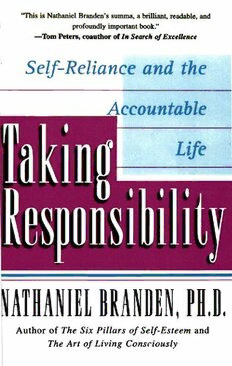Table Of Content''This is Nathaniel Branden's summa, a brilliant, readable, and
profoundly important book."
-Tom Peters, coauthor of I" Search 0/ Exeelle1lCe
Self-Reliance and the
Accountable
Life
PH.D.
ATHANI~l BRAND~N,
Author of The Six Pillars of Self-Esteem and
The Art of Living Consciously
Other Books by Nathaniel Branden
The Six Pillars of Self-Esteem
The Art of Self-Discovery
The Power of Self-Esteem
Jud9ement Day
How to "alse Your Self-Esteem
To See What I See and Know What I Know
Honoring the Self
If You Could Hear What I Cannot Soy
What love Asks of Us
The Psychology of "omontlc Love
The Disowned Self
()reaklng Free
The Psychology of Self-Esteem
TAKING
Responsibility
Self-Reliance
and the
Accountable life
Nathaniel
Branden
A FIRESIDE BOOK
Published by Simon & Schuster
FIRESIDE
Rockefeller Center
1230 Avenue of the Americas
New York, NY 10020
Copyright e 1996 by Nathaniel Branden, Ph.D.
All rights reserved, including the right of reproduction
in whole or in part in any fonn.
First F'treside Edition 1997
FIRESIDE and colophon are registered
trademarks of Simon &: Schuster Inc.
Designed by Elina D. Nudelman
Manufactured in the United States of America
10 9
Library of Congress Cataloging-in-Publication Data
Branden, Nathaniel.
Taking responsibility: self-reliance and
the accountable life / Nathaniel Branden.
p. cm.
Includes bibliographical references and index.
1. Responsibility. 2. Self-reliance. I. Title.
BJ1451.B73 1990
158'.1-dc20 95-36640
CIP
ISBN·13: 978·0·684·8\083-6
ISBN·IO: 0·684.81083·2
ISBN·13: 978·0·684·83248· 7 (Pbk.)
ISBN·IO: 0·684·83248-8 (Pbk.)
c
o n t e n t s
Introduction 7
1
Toward Autonomy 17
2
Freedom and Responsibility 39
3
Self-Reliance and Social Metaphysics 57
4
A Self-Responsible Life 91
5
The Challenge of Separation 125
6
Self-Responsibility and Romantic Love 144
7
Accountability in Organizations 167
6
A Culture of Accountability 191
Appendix: A Sentence-Completion
Program for Growing in Self-Responsibility 223
Selected Bibliography 235
Acknowledgments 237
Index 239
Introduction
I will
begin with a personal story that illuminates a primary aspect
and benefit of self-responsibility that is rarely understood, the
achievement of happiness.
As I approached my sixty-first birthday a few years ago, I
found myself thinking a good deal about the subject of happi
ness, and about making its attainment my conscious purpose.
At that time I was embarking on a project that had the poten
tial to generate a good deal of stress, and I was detennined that
my daily mood and the harmony of my marriage not be ad
verselyaffected.
I thought about my wife Devers, who is the most consistently
happy human being I have ev« known, as well as one of the
most self-sufficient. When I met her I felt that I had never en
countered anyone for whom joy was more her "nature." Yet her
life had not been easy. Widowed at twenty-four, she was left to
raise two small children with very little money and no one to
help her. When we met, she had been single for many years,
had achieved success in a number ofj obs, and never spoke of
7
INTRODUCTION
past struggles with any hint of self-pity. I saw her hit by disap
pointing experiences from time to time, saw her sad or muted
for a few hours (rarely longer than a day), then saw her bounce
back to her natural state ofj oy without any evidence of denial or
repression. It took me some time to fully believe what I was see
ing: that her happiness was md-and larger than any adversity.
When I would ask her about her resilience, she would say,
"I'm committed to being happy." And she added, "That takes self
discipline." She also had a habit I thought unusual: She ahnost
never went to sleep at night without taking time to reviewevery
thing good in her life; those were typically her last thoughts of
the day. I thought this was an important clue to what I wanted
to understand about the psychology of happiness.
We talked about the fact that there is a tendency for most
people to explain feelings of happiness or unhappiness in
terms of the external circumstances of their lives. They explain
happiness by pointing to the positives; they explain unhappi
ness by pointing to the negatives. The implication is that
events determine whether they are happy; they take little or no
responsibility for their state. I had always been convinced, as
had Devers, that our own attitudes have far more to do with
how happy we are than do any external circumstances.
I said to her: Take a man who is basically disposed to be
happy, meaning that he feels happiness is his natural condi
tion, and is happy a significantly greater amount of the time
than he is unhappy. Let some misfortune befall him-the loss
of ajob, or a marriage, or being hit by some physical disabil
ity-and for some time he will suffer. But check with him a few
weeks or months or a year later (depending on the severity of
the problem) and he will be happy again. In contrast, take a
man who is basically disposed to be unhappy, who feels unhap
piness is more natural thanjoy, and who is unhappy a signifi
cantly greater amount of the time than he is happy. Let
something wonderful happen to him-getting a promotion,
inheriting a lot of money, faIling in love with an exciting
8

